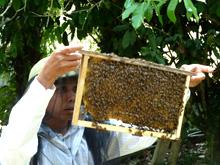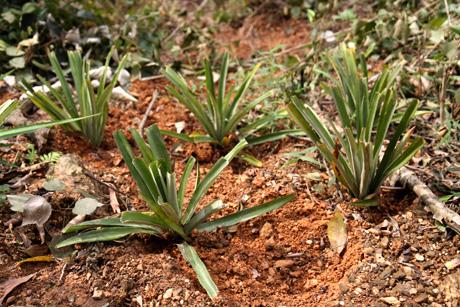Context
Viet Nam is one of the countries most at risk from the negative impacts of climate change. The Spanish environmental organisation DARA estimates that this problem costs the country’s economy USD 15 billion every year (Climate Vulnerability Monitor 2012, DARA), equivalent to about five per cent of the gross domestic product.
Viet Nam is regarded as a hotspot of biodiversity. A large proportion of its flora and fauna is endemic. The impacts of climate change are threatening this diversity. At the same time, it has been found that maintaining stable, functional ecosystems assists adaptation to climate change if these systems and the people living in them become more resilient. The main factors reducing biodiversity are currently changes in land use resulting from continuing economic growth and the expanding population.
Alongside enhancing people’s resilience to climate-related risks, ecosystem-based measures are seen as a good alternative – or a supplement – to technical measures. They have significant secondary benefits, including food security, the preservation of livelihoods and biodiversity, and improved protection against natural disasters.
In the field of climate protection, the Vietnamese Government has set itself clear goals for adapting to climate change, preserving biodiversity and using it sustainably. This is manifested in a number of laws and decrees, the ratification of international agreements, and participation in international initiatives. However, there are too few openings for the mainstreaming of ecosystem-based solutions in policy-making and society. In addition, there is a lack of effective instruments and procedures for implementing ecosystem-based measures that contribute to and monitor adaptation to climate change.
Objective
Innovative, effective methods, strategies and policy guidelines for ecosystem-based adaptation are available to land-use and development planners, and are systematically integrated into the national adaptation policies and gradually being implemented in practice.
Approach
The project supports Viet Nam’s efforts to systematically mainstream ecosystem-based solutions in policy and society. It strengthens the capacities of national and provincial stakeholders to integrate ecosystem-based measures into decision-making and planning processes for national climate-change adaptation policy and to ensure their long-term implementation on the ground.
Furthermore, the project provides its Vietnamese partners with technical support in securing national and international funding for ecosystem-based adaptation strategies. It also encourages the sharing of relevant experience in regional and international dialogue forums.
The project acts in four main areas:
- Awareness-raising and capacity development for stakeholders at national and provincial levels. These stakeholders should be able to recognise the advantages of ecosystem-based adaptation and acquire the ability to integrate and implement appropriate procedures.
- Scaling up. The project is elaborating a solid basis for a more extensive implementation of ecosystem-based adaptation measures. This draws on an evaluation of the existing experience and a pilot measure aiming to develop technical instruments, guidelines, manuals and monitoring approaches.
- Integration of ecosystem-based adaptation into the national climate-adaptation policies and the relevant legal framework (with a focus on land-use and development planning) and identification of national and international sources of funding.
- Evaluation of the experience gained from special interventions and pilot measures; support for the partners and stakeholders in sharing the knowledge gained from the activities via national and international networks and platforms.
Results
-
Mainstreaming of ecosystem-based adaptation measures in planning:
The project is active in the creation and revision of numerous guidelines and legal framework agreements in the areas of environment and climate. For example, it assisted the passage of a resolution on revising the land-use master plan up to 2020 and the updating of Climate Change Response Action Plans (CCRAP) for 2016 to 2020 in the Ha Tinh and Quang Binh provinces. Ecosystem-based adaptation was integrated into the provincial CCRAP for the period from 2016 to 2020. The people’s committees in the provinces have approved the plans. -
Awareness-raising and capacity development:
More than 15 training courses have been held on ecosystem-based adaptation and its integration into development planning for various target groups, from farmers to ministerial decision-makers. This has markedly raised participants’ awareness of climate change, its effects and the need for active adaptation to climate change, which in turn has increased the stakeholders’ commitment and willingness to cooperate. They also understand the relevance of ecosystems to successful and sustainable adaptation to climate change. -
Vulnerability assessment of socio-ecological systems:
A vulnerability assessment of socio-ecological systems has been conducted in the Ha Tinh and Quang Binh provinces to enable ecosystem-based adaptation measures to be scaled up. A professional team of advisors has identified over 70 socio-ecological systems and elaborated ecosystem-based adaptation measures for the ten most important systems. These considerations have fed into the CCRAP in Ha Tinh and Quang Binh provinces for the period from 2016 to 2020. -
Pilot measures:
The Ha Tinh and Quang Binh provinces began implementing ecosystem-based adaptation measures at the end of 2016. For example, natural forest has been rehabilitated in the Son Tho commune in Ha Tinh. The forest has important functions for protecting the climate and storing water. Orange and pineapple plantations, the planting of ground cover, bee-keeping and composting are providing a response to the increasing dryness of recent years and generate additional income for the villagers. -
Multiplication effect:
To bring ecosystem-based adaptation to a wider audience, the project has presented its approach at a large number of international conferences. The websites climatechange.vn/eba and naturalcapital.vn have also been developed as information platforms. The project is now publicising both of these websites at events and in communication materials in order to gain more users.

